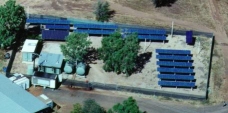 Information
about the station can be found in the detailed
paper, which deals mainly with the performance differences
between the Canon amorphous and Solarex Polycrystalline silicon
cells, here are the abstract and conclusions of the paper. Information
about the station can be found in the detailed
paper, which deals mainly with the performance differences
between the Canon amorphous and Solarex Polycrystalline silicon
cells, here are the abstract and conclusions of the paper.
Abstract
The first commercial hybrid power station installation of
Canon’s triple junction amorphous silicon panels is
at the Power And Water Authority’s Solar Research site
in the Northern Territory remote community of Jilkminggan.
The site experiences regular high ambient temperatures and
high humidity in the Wet Season, which is a testing environment
for any new product. This paper compares the performance of
the Canon product with that of the Solarex poly-crystalline
silicon panels which are also installed at this site. It details
the performance differences for varying temperatures and solar
radiation levels. As the arrays are connected to a working
mini grid, the effects of different operating conditions on
the performance of the arrays are also documented.
Conclusions
The Jilkminggan solar research facility is a fully operating
power station, receiving a substantial contribution of its
energy from various solar arrays. The station is located in
a hot and humid zone of the Northern Territory and thus ideally
suited to rigorous testing of solar products. Solarex poly-crystalline
and Canon triple junction amorphous solar panels have been
in-field performance tested side-by-side.
The results show that the Solarex product is twice as prone
to ambient temperature induced output reductions than the
Canon product. Based on rated peak power, the overall power
output of the Canon product in the test environment is between
20% and 30% higher than that of the Solarex panels. This is
a very substantial difference and needs to be kept in mind
when either choosing or analysing the costs of solar panel
products. This result does not means that the Solarex panels
don't work well, they just perform worse than the Canon panels
when compared with their rating in this environment.
All the tests and analysis are based on real field data. No
theoretical data or assumptions have been used. As the amorphous
material reacts so differently to the poly-crystalline one,
a theoretical comparison will never predict the actual performance
nearly as well as in-field tests such as the ones described
in this paper.
Download the Paper
This paper is in Adobe pdf format and 928kb in size. Click
here to download or view it.
Further Information
At the moment, no other papers or publications about this
work are publicly available. Specific questions can be directed
to the author Wolfgang Meike.
|
|

